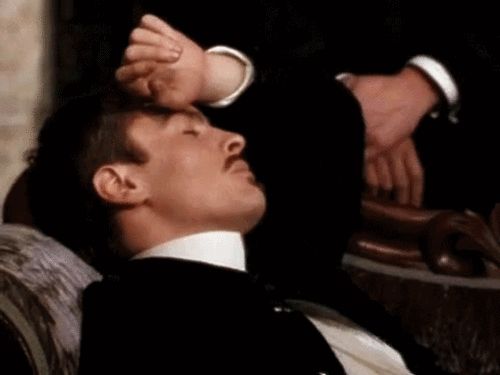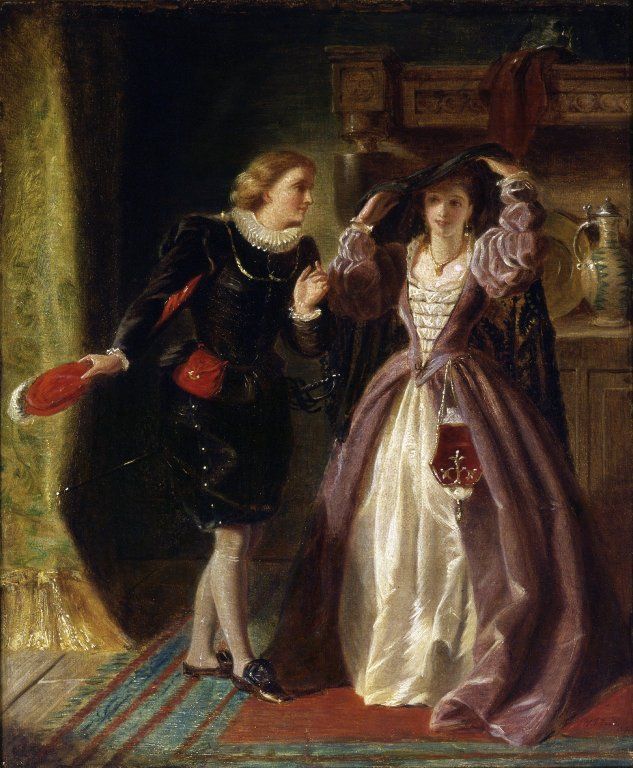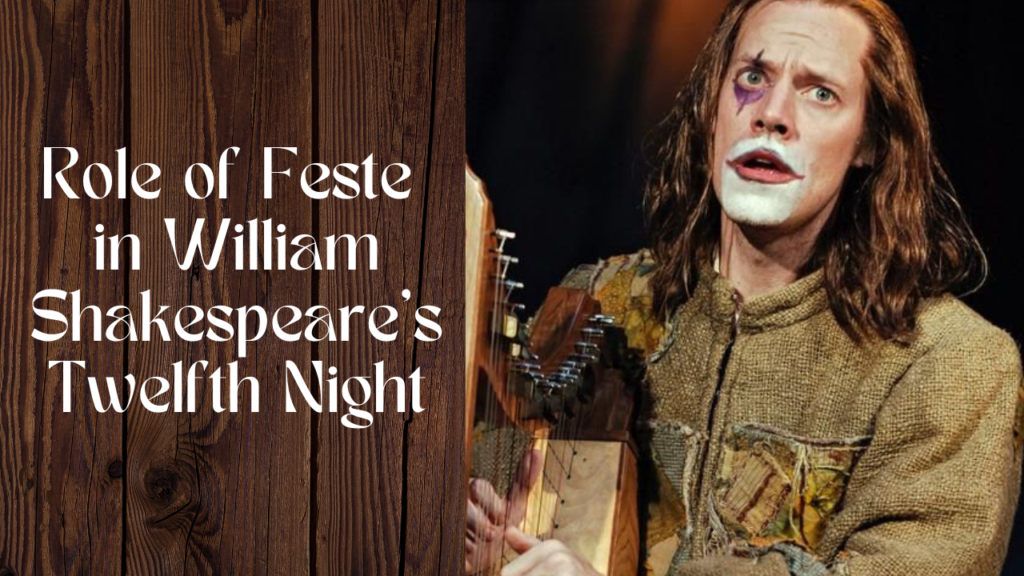Introduction
Twelfth Night can be considered a model Shakespearean comedy in that it employs nearly every feature of the genre: a wedding, mistaken identities, misunderstandings, physical comedy, and a happy ending. Like all of Shakespeare’s comedies, the play ends with wedding(s). In this case, the joint wedding of two sets of lovers: Olivia and Sebastian, Orsino and Viola.
Shakespeare is perhaps the greatest playwright that ever lived. His plays were fascinating and brilliantly written. Within Shakespeare’s plays, one notable character wears a literal disguise to accomplish a goal, while others use figurative disguises. These ideas are best exemplified in Twelfth Night, written by Shakespeare between 1599 and 1601. Viola dresses as a man, Orsino, to search the country of Illyria for her brother, Sebastian, who was lost at sea during a storm. In order to fulfill the goal of finding her brother, the disguise put on by her causes confusion among Illyria’s aristocracy.
Disguise and Dramatic Irony
A comparable kind of dramatic irony is produced by Shakespeare’s use of disguise in comedy, particularly the disguising of women as young men. In Twelfth Night, Olivia, who mourns her brother’s death, has sworn to be a recluse and keep herself a veiled recluse for seven years. She finds herself smitten by Cesario, a young man sent with messages from Duke Orsino. Cesario is, of course, the disguised Viola, and the comedy of Olivia’s mistakenly amorous responses to him lies at the funnies, because it corrects Olivia’s self-denying and impossible mournfulness.
As ever in Shakespeare’s comedies, it takes mistakes to teach characters the full truth of their own hearts. Olivia bumps into Viola’s twin brother, Sebastian, and proposes marriage to him. He is hilariously puzzled but compliant; it is as if he knows that he is in a comedy, where accident and error will mysteriously produce happy consequences.
The apparent restraint placed upon a playwright of Shakespeare’s day—all women must be played by young male actors—becomes a kind of artistic freedom, enabling the characters to switch their sexual identities.
Orsino’s Disguise of Love
Twelfth Night opens in a scene with Orsino, Duke of Illyria. The Duke is “love-sick” and pining for the affections of Lady Olivia. Orsino states, “If music be the food of love, play on, give me excess of it.” Later, in the same scene, it is learned that Olivia is the subject of that “love-sickness”, and nothing can quench his love but Olivia’s. From the above quote, it is apparent that the Duke’s love is superficial. He describes possible emotions that he can think at that moment, but never expresses why he loves her. Thus, Orsino has created a disguise for himself.
He is not “in love with a person but in love with love.” Orsino does not understand what love truly is, and therefore, remains locked in a state of helplessness. Joseph Summers, on The Masks of Twelfth Night from Twentieth Century Interpretations of Shakespeare, argues that Orsino is “A noble duke, in name… with name” he is bound by his own mask of love. The mask is a distorted sense of love and is fed by boredom, lack of physical love, and excessive imagination.
The falseness of Orsino’s love is compounded by the real emotion that Viola feels for her brother Sebastian. It is no surprise that she is the next character the audience is introduced to after Orsino. Viola inquires after Lady Olivia, the first Illyrian that the captain alludes to in his speech. Viola states: “O, that I served that lady / And might not be delivered to the world.” Viola later decides it would be better for her to seek for service in Duke Orsino’s court, the second Illyrian that the captain mentions.
If Viola sought service with Olivia, the play would not have had the source effective comedy of a woman in a man’s disguise. Also, Viola would not have had the freedom, or the chance to view life from the male perspective. In order to do so, she must disguise herself as a man, later known as Cesario, to assist her in finding her brother.

Viola’s Disguise
Dressing as a man would ensure her safety, especially against sexual dangers, and Viola would have access to certain parts of the city that might be closed to females. In disguise would preserve her virtue. She is new in Illyria, and being new and female at the same time would pose a problem for a female. It is notable that Viola’s decision to dress as a male adds to the comedy of the play. Donning a male costume, she becomes Cesario, page in Duke Orsino’s court.
Regarding Viola, critic L.B. Salings on The Design of Twelfth Night states that Viola is disguised not just for her access to a different world, but it also causes many problems. It can be speculated that Orsino does have romantic feelings for Viola as they have a close relationship. Viola falls in love with Orsino at first sight, but her disguise keeps her from acting on this feeling. Instead, the relationship becomes a “friendship” and the characters divulge personal romantic information to one another.
Viola’s disguise gives her the chance to work as a page in Orsino’s court, a situation where she is privy to Orsino’s feelings considering Lady Olivia. Orsino says, “….I have unclasped to thee the book even of my secret soul.” Viola’s intention had been to dress as Cesario so that she could find her brother, but now another woman is attracted to her disguise—which is Olivia.

Homoeroticism and Confusion
References to homoeroticism in Twelfth Night come from the relationship between Sebastian and Antonio. While Sebastian doesn’t indicate that he has romantic feelings for Antonio, Antonio openly expresses his adoration and love for Sebastian. The intensity of his feelings seems to imply erotic interest, as when he tells Sebastian:
“I could not stay behind you. My desire / More sharp than filed steel, did spur me forth.”
When Antonio is led away by the officials, it occurs to Viola that Antonio’s mention of Sebastian’s name shows that her brother is still alive. But the confusion caused by the resemblance between Viola and Sebastian has greatly distressed both Antonio and Viola.
The next to make a mistake in recognizing the twins is Feste. He has been asked by Olivia to go to Cesario and convey her message to him. The clown comes upon Sebastian and naturally mistakes him for Cesario. Sebastian warns him not to bother him anymore: “If you tarry longer, I shall give you worse payment.”
Just then Sir Andrew arrives there. He has been looking for Cesario in order to strike up a fight. Seeing Sebastian, he is surprised by the unprovoked attack of Andrew and retaliates with a shower of blows. “Are all people mad?” he asks. Sir Toby and Fabian enter the scene and a fight is about to begin when Olivia arrives and brings the situation under control.
Olivia, out of passion, mistakes Sebastian for Cesario, another problem that Viola’s disguise has created. He enters the play at a moment when he is needed most. Sebastian is needed to relieve Viola of her disguise. Not only does it create gender confusion and homoeroticism, it causes madness among the characters.
Resolution
In Act V, problems achieve their solutions when Sebastian and Viola come face to face, and Viola’s goal is successfully achieved. To Viola, Sebastian comments: “…Add a sister, whom the blind waves and surges have devoured.” He is astonished, and during his interrogation, has hope that this look-alike has answers concerning his sister’s whereabouts.
Orsino understands the extent of Viola’s disguise. Now, he wants to see her in “woman’s weeds.” Olivia chooses, at the end, to marry the man that she thinks is Cesario; yet when it is discovered that she did not marry Cesario, she is content with the situation.
Orsino decides to marry Viola after seeing her affections for him, and the play ends happily with three marriage sets:
- Olivia and Sebastian
- Viola and Orsino
- Sir Toby and Maria


